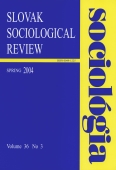The Meaning and Importance of European Identity and its Relationship to Regional and National Identities in Spain: Some Contributing Factors to the De
The Meaning and Importance of European Identity and its Relationship to Regional and National Identities in Spain: Some Contributing Factors to the De
Author(s): María Ros, Héctor Grad, Gema Garcia-Albacete, Miryam Rodrígues-MonterSubject(s): Social Sciences
Published by: SAV - Slovenská akadémia vied - Sociologický ústav
Keywords: European identity; youth; regional identity; national identity; Europe as a social category; Slovakia: Impact of European Union membership;
Summary/Abstract: The Meaning and Importance of European Identity and its Relationship to Regional and National Identities in Spain: Some Contributing Factors to the Development of European Identity. European, Spanish, and regional identities were studied as part of a wider research survey of youth beliefs and experiences regarding the European Union. The research was conducted in the capital city (Madrid) and the Basque Country (Bilbao). At each location, representative and European-oriented youth samples (N=400 and N=100 each) of 18-24 years (50% female) were gathered. The interviewees were asked about their perception of border countries as included in Europe, and to rate different feasible meanings of the EU, its impact (at personal, regional, and country levels), and different cognitive, affective and evaluative aspects of European, Spanish and regional identities. Regarding European borders, Turkey was the only country most interviewees did not perceive as part of or belonging to Europe. Geography, membership in the EU and, above all, the Euro currency emerged as the most salient features of meaning for Europe (beyond shared values and traditions). The European Union was perceived as having a positive, but small impact for the person, moderate for the region, and greater impact for the country of Spain. The identity patterns were similar in most of their aspects: In Madrid, the Spanish identity was the most important, the importance of regional identity was similar to it, and the identification with Europe was moderate, the least important. In Bilbao, the identification with the Basque Country was the strongest, while Spanish and European identities were related and came out of “little” importance. Older interviewees presented stronger European identity in the pro-European but weaker in the general sample. Finally, interviewees considered themselves only “sometimes” as a “European citizen” with no significant difference by Region, Age or Gender group. These relationships seem to reflect the configuration of different levels of social identity. The hegemony of different nationalist orientations led to a distinct meaning of national identity in each region (Spain in Madrid but the Basque Country in Bilbao). Thus, instead of a continuum of social category inclusiveness (as suggested by Brewer 1991), the results show different breaches between levels of social categories and identities – between Basque and higher levels in Bilbao and between Spanish and higher levels in Madrid. Summing up, the identity level reflecting the dominant national identity seems to function as a basic category distinctively organizing the whole identity configuration. The impact of the European Union was perceived as much stronger for the country (Spain) than for the region and the person. Madrid and pro-European samples perceived stronger impact on the less inclusive categories. Beyond the different identity configurations, these patterns suggest a relationship between the w
Journal: Sociológia - Slovak Sociological Review
- Issue Year: 2004
- Issue No: 3
- Page Range: 219-236
- Page Count: 18
- Language: English

